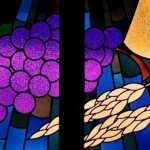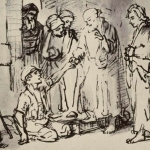Sermon From Sunday February 17th 2013 / 1st Sunday In The Season Of Lent

God's Security System
Pastor Terry Defoe, Mount Olive Lutheran Church, Regina, Saskatchewan, Canada
Copyright © 2013. Pastor Terry Defoe. All Rights Reserved.
My message on this First Sunday in the season of Lent is based on Psalm 91. I'm reading verse 15:
15 He will call on me, and I will answer him;
I will be with him in trouble,
I will deliver him and honor him.
16 With long life I will satisfy him
and show him my salvation.”
New International Version®, NIV® © 1973, 1978, 1984, 2011 by Biblica, Inc.®.
This morning, we’ve come to the first Sunday in Lent. Lent is the time of year when we think about Jesus' journey to the cross. It’s the time of year when we take time from our busy schedules to ponder the meaning of the cross and our Lord's suffering for our sakes. The appointed Psalm for today is Psalm 91. And I'd like to focus on that Psalm this morning. I pray that God would bless our consideration of His Holy Word.
We live in a world that's preoccupied with peace and secur¬ity. We live among people who are willing to spend a lot of money in order to buy protec¬tion for them-selves. Security systems are big business these days. Our church has one. I’m pretty sure your home or apartment has one as well. Things aren't as they used to be. We don’t trust others as much as we used to. Everyone needs protection from those who would break in. Human beings are vulnerable. No matter how you look at it, we're are a lot more vulnerable than we'd like to be. It's in our nature to want to protect ourselves. And there’s absolutely nothing wrong with that. We want to reduce our vulnerability to a minimum. There is much that we as human beings are vulnerable to. We are vulnerable to physical dangers. And God’s Word reminds us that we are vulnerable to spiritual dangers, as well.
I read not too long ago about a young boy walking home from school. While he was on his way home, a group of gang members attacked him. And the boy said afterwards that he knew they wanted to harm him. He could see it in their eyes. That young boy knew that his attackers wanted to hurt him. He knew he was vulnerable. His fear is the kind of fear that we may have when we’re walking alone after dark. It's the all people experience when they know they're vulnerable.
As human beings, we're vulnerable to disease. Even with all the recent advances in medical science, there’s much that medical science doesn't understand and many diseases that are incurable. Parents were afraid of diseases that could take their children from them. They want to have their children immunized as a precaution. And now, even those immunizations are controversial. Some fear that they do more harm than good. It’s interesting that human beings haven't changed over the years. We're concerned about the same kinds of things today that people were concerned about long ago.
Psalm 91 deals with those concerns. It helps God's people put them into the proper per¬spective. Psalm 91 is a Psalm about faith. As a matter of fact, Psalm 91 is a Psalm about the BENEFITS OF FAITH. In sixteen verses, we hear about the benefits God's people enjoy. In sixteen verses we are reminded about God's care and compassion for vulnerable people. We hear what God had done for his people to protect them.
Before I talk about the BENEFITS OF FAITH, as we find them in Psalm 91, I need to take just a moment to give you a Biblical definition of what faith is. Psalm 91 itself gives us several definitions of faith. First of all, according to the Psalm, faith is trust. Absolute trust. Unconditional trust. Not trust in ourselves. Not trust in other people or other things. But trust in God – Father, Son and Holy Spirit. Biblical faith takes God at his word. Biblical faith believes his prom¬ises. In the Old Testament, faith trusted that God would send a special Servant, one that they called the "Messiah." In the Old Testament, faith trusted that God would sent the "Messiah" to overcome sin.
So faith is trust, according to Psalm 91. Jesus talked about faith that way. At one point, He pointed out a little child and said that child was an example of what faith – true faith – looks like.
"Have faith like a little child," He said.
Biblical faith trusts God with the same kind of trust that a child has for a loving parent. To have faith, according to Psalm 91, is to "dwell in God's house." And to "dwell in God's house" is to worship with his people. To "dwell in his house" is to be part of his family of believers. There’s more. To have faith is to love God, according to this Psalm. To have faith is to love him without strings attached. To have faith is to love God with all your heart, and mind, and strength.
There's still more. To have faith is to "acknowledge His name." To acknowledge God's name is to admit that he exists and to do his will. In ancient days, to know someone's name was to know something about them. Their name often revealed something about their character. To know God's name, to ack¬nowledge his name, is to know him, to be in rela¬tionship with him. To know God's name is to be close to him.
So faith is trust. It’s dwelling in God's house. It’s love for God. It’s acknowledging his name. There's one more aspect to faith, according to the 91st Psalm. Faith is "calling on his name." In other words, faith is also prayer – ongoing com¬munication with God. God's people trust him. They dwell in his house. They love him. They acknowledge his name. And they communicate with him as well.
According to Psalm 91, the kind of faith that we've been describing brings benefits to those who possess it. Psalm 91 lists at least seven benefits that belong to those who have this kind of faith. It's interesting that the number 7 in the Bible is the number for comple¬tene¬ss. Faith – Biblical faith – brings with it all of the blessings that God intends for people.
And what are those bene¬fits? The first benefit of faith is God's presence with his people. God promises to be with his people and to never leave them. The second benefit of faith is the shelter that God provides for his people – shelter that protects them from danger and reduces their sense of vul¬nerability. That shelter is described in the 91st Psalm as a safe haven. It's a refuge from danger. It's a walled fortress, which danger cannot penetrate. As a mother bird protects her little ones, says the Psalm-writer, so, too, God pro¬tects those who trust him. God brings his people through dangerous situations. He sends special messen¬gers to watch over his people and keep them safe. God protects his people from the things that cause them to stumble and fall. He keeps their path safe.
According to Psalm 91, God protects his people from a wide variety of dangers. He protects his people from venomous snakes. He protects them from wild animals. He protects them from the terrors that come in the night. The Psalm describes God's protection as being like a warrior's shield that deflects arrows and spears. God protects his people from the hot sun. He rescues his people from traps and snares. He pro¬tects his people from those who would harm them. God protects his people from disease. He brings health and strength to those who trust in him.
Psalm 91 lists the benefits of faith. And that list is long. The advantages of faith are many. There are many reasons to praise and thank God. Psalm 91 was written almost 1000 years before Christ was born. And Psalm 91 lists the benefits that Old Testament believers enjoyed.
But what about the New Testament? What benef¬its did New Testament people enjoy after Jesus arrived on the scene? Faith in the New Testament is the same as faith in the Old Testament. New Testament faith, like the faith that came before it, trusts God. But now that trust is in God AND IN HIS SON, JESUS CHRIST. Jesus is the Messiah, the one that the Old Testament promi¬sed would come. Jesus is God's Prophet, the One who came to deal with sin. To have a New Testament faith is to trust God and his Son. Like those who came before them, New Testament believers also dwell in God's house. But now God's house is his church – his people gathered out of the world to worship and praise him.
Those who have faith in God today, like believers in the Old Tes¬tament, love him unconditionally. Believers today love God and His Son without strings attached. Believers today also ack¬nowledge God's name. Believers today know that God exists. They know that God, as their Creator, has a claim on their lives. And there's one more thing. Like those that came before them, modern believers communicate with their Heavenly Father through prayer.
Faith hasn't changed much over the years. And neither have the benefits that God offers to his people. The only difference for us today is that Jesus the Messiah has come and has fulfilled God's plan of salvation. Old Testament believers looked forward to the coming of the Messiah. We look back to his coming and remember what he has done for us. God is present with us today, just as he was in the days when Psalm 91 was written. But now he is present with us in the form of his Son, Jesus Christ. Another name for Jesus that we often use in the church is Emmanuel. And Emmanuel, in the language of the Bible, means "God is with us." In Jesus, God is with us in a very special way.
In our day, too, we enjoy God's protection from harm. During his ministry, Jesus was saddened by the unbelievers in Jerusalem who refused to let him bless them. Jesus spoke of wanting to bring the people of Jerusalem under his wing, much as a mother bird would protect her young, but the majority of the people in Jerusalem were not willing to let him do that. The New Testament speaks of a shield that protects God's people from the Evil One's fiery darts.
The New Testament speaks of how God rescued us from the bondage of sin. The Bible desc¬ribes sin as a force that makes slaves of people. But God, through the death and resurrec¬tion of his Son, Jesus Christ, has made a way to set people free from that bondage to sin.
Psalm 91 said that Old Testament people were promised protection from plague and pestilence. In the New Testament, Jesus spent much of his time bringing health and healing to people. But for Jesus, health meant more than absence of dis¬ease. For Jesus, health meant wholeness of body and soul. For Jesus, health meant forgiveness, and hope, and peace.
The season of Lent begins with Ash Wednesday. Ash Wednesday was this past week. Here at Mount Olive Lutheran Church, a group of Christians came to a worship service last Wednesday night. Last Wednesday night, God’s people received the mark of the Holy Cross on their foreheads and then knelt at this altar to receive Christ's body and blood with the bread and wine of Holy Com¬munion. Last Wednesday, as the season of Lent began, God's people gathered here to enjoy the benefits of their faith in him. During the 40 days of Lent, we follow Jesus to the cross. During Lent we are confronted with the cross and with what happened there. In this season, we think about the price that Christ paid to set us free from sin. We think about his sacri¬fice for us. At this time of year, God's words in Isaiah 41 take on new meaning for us. He says:
"Do not fear, for I am with you; do not be dismayed, for I am your God. I will strengthen you and help you."
We do live in a dangerous world. We are vulnerable to harm. But God has promi-sed to protect His beloved children. We take him at his word. God doesn't want His people to be overly con¬cerned with the dangers of this world. He doesn't want His people to stay home, afraid to venture out. God wants people to experience peace and joy. He wants people to experience his power and his protec¬tion. God wants his people, believers in his Son, Jesus Christ, to be dif¬ferent from those who have no faith. He wants his people, believers in his Son, Jesus Christ, to enjoy all of the benefits Christ died to bring.
Being a Christian, a follower of Jesus of Nazareth, doesn't mean that you and I are immune to suffering and danger. When Chris¬tians are cut, they bleed. When Christians come down with an incurable disease, they die, just like anyone else. But God has promised to be with us, every day of our lives. When we walk through the valley of the shadow of death, WE FEAR NO EVIL, because God is with us, and his rod and staff comfort us. We know that He sets up a table for us, IN THE VERY PRESENCE OF OUR ENEMIES, and offers us a rich meal.
We live in a world that is very concerned about security and protection. We live in a world where prudent people take pre¬cautions. Some things change, and some things remain the same. This world changes. But God remains the same. The New Testament tells us that Jesus Christ is the same yesterday, today, and forever. Christ still brings health and healing. He still brings forgiveness and peace with God. Christ is now that mother bird that takes her little ones under her wing.
This morning, Jesus would say to us,
"Trust me. Let me serve you. Let me forgive you. Let me write your name in my book of life. And let me take you to heaven when your days on this earth are over.”
The message we proclaim regarding Jesus Christ is Good News. The security we so desperately need is to be found in Jesus Christ. It was Jesus who said,
"In this world, you will have trouble. But take heart. I have overcome the world."
We thank God for His marvelous gift of faith. God's blessings are ours in abundance because of what Jesus Christ has done for us. Thanks be to God! Amen.
Let's Pray: DEAR HEAVENLY FATHER – Give us the kind of faith that your people have always had. Give us a faith that recognizes Jesus as your Son – that recognizes his work for us on the cross for our salvation from sin. And bless us with the benefits your people have always enjoyed – an abundant life in the here and now and eternal life in the world to come. We pray in Jesus our Savior’s name. Amen.


